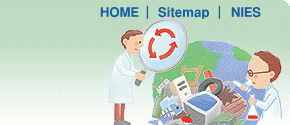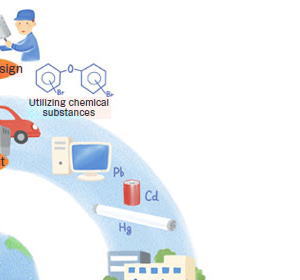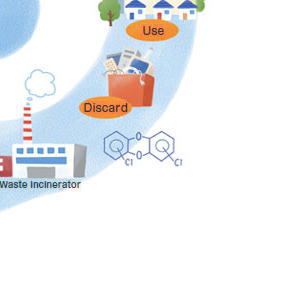
A product consisting of diverse chemical substances is recycled as resources or processed / disposed of as waste at the end of its life. In a
sound material-cycle society, we need to reduce waste generation as much as possible and on top of this, recycle/reuse waste as recycled
materials. To realize such a society, we must avoid additional pollution risks from the inadequate reuse of or the process of recycling products
(waste) containing hazardous substances as far as possible. For this reason, it is necessary to identify whether each type of waste is reusable,
recyclable, or suitable for recycling use. In the meantime, research on recycling and utilizing resources effectively, while ensuring their safety
in the recycling processes, is also important. This research project will investigate substances' behaviors, environmental risks and values
as resources in their utilization, disposal and recycling processes and scientifically evaluate the effect of implementing measures to promote
recycling, regulate hazardous substances, and recover valuable materials from both value and hazard points of view so that the recycling use
of resources and the treatment and disposal of waste may be properly undertaken in society. More specifically, the project will focus on
the following three themes, targeting major substance groups of interest under the domestic recycling promotion laws or from international material cycles.

Taking note of the hazard of chemical substances employed for their usefulness such as brominated flame retardants and
other additives contained in plastic products, we will investigate their process behaviors and control measures, and evaluate their
advantages/disadvantages compared with their substitutions.
Further, we will establish analytical methods for target substances and try
to identify the risks that must be controlled or managed based on basic researches including toxicity evaluation and field surveys. Then, we
will propose substance management measures effective in both useful and hazardous aspects of substances through their life cycles.

We will propose methods of recovering metals from waste by quantifying hazardous metals released into the environment and the
feasibility of valuable metal recovery. We will establish the analytical methods for products, accumulate information on metal contents,
and also develop the detailed material flows of metals. For hazardous metals, we will check environmental release, methods for reduction
and the quality of recycled products in their recycling or disposal processes. For valuable metals, the feasibility and cost performance for
recovery will be studied for each material and product such as cars, electronic and electric appliances, OA machines, batteries, printed
circuit boards, and catalysts.
Through these studies, we will propose management methods to achieve both increasing recovery rates and
decreasing risks for metals.
We will establish determination methods on environmental safety quality level and organize them as guidelines, by proposing safety quality
control methods and standard test methods for recycled products originated from waste. This research activity will specifically address recycled
products for construction materials, which are used in particularly large quantities. We will promote this research with water pollution
events as our major concerns. More specifically, we will establish and standardize several types of leaching tests depicting water pollution
risks and develop assessment frameworks by combining leaching test results and numerical models representing pollutant generation and
transfer.
Further, we will propose guidelines on determination methods for safety quality level. Validity of the frameworks and determination
methods is checked through environmentsimulation experiments.







